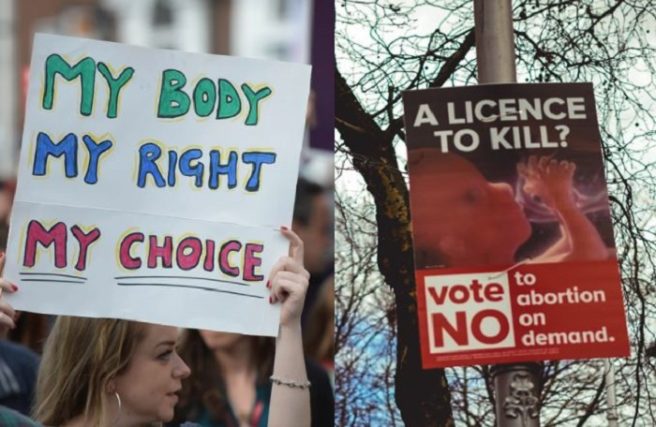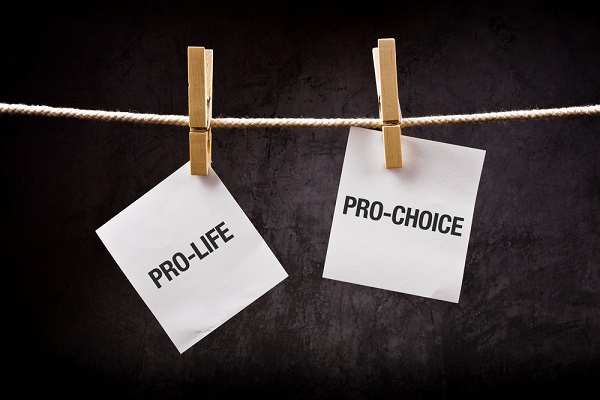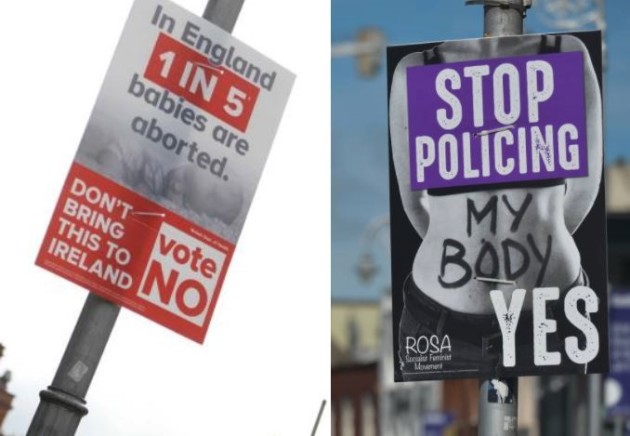
Undecided on the eighth? We talk to both sides of the Repeal debate
The referendum to repeal the eighth amendment is shaping up to be the most divisive vote in a generation.
With about 30% of voters still undecided which box to tick on the 25th of May, we ask two Irish millennials which way they're voting and why.
Clare, 23, is an Arts student and advocate for the no vote. Aura, 23, is a journalist and volunteer for Migrants and Ethnic Minorities for Reproductive Justice (MERJ).

Why are you pro-life/pro-choice?
Clare: The conversations I have with my pro-choice friends usually boil down to one question: Is this a life or not?
I recently watched a video of my cousin’s 11 week scan. It really was the most adorable thing! The little baby is stretching, waving their little hand and wiggling around. We found out at just 9 weeks the baby’s eyes have colour in them, and it’s mouth has tiny taste-buds, and at 10 weeks the little baby’s heart is already beating at 180 beats a minute – that’s three times faster than your own heart!
If we are voting to legalise abortion in Ireland, we really must evaluate what it is we are choosing. Most countries legalised abortion before ultrasounds were widely available. Abortion sadly targets a baby that is most definitely alive before an abortion and is not alive afterwards.
This time yes is a step backwards.
Aura: I am pro-choice; we must start trusting women in Ireland to make decisions over their body and lives by making abortion accessible here.
The 8th amendment hasn't stopped abortions from taking place, it has made them more difficult to obtain and adds unintended consequences in maternity services.
Activists who secure pills, doctors abroad that perform abortions and ordinary citizens who give women support following a termination are doing the job of our health service.
Some of us cannot travel due to legal status, finances or commitments at home – this means that the 8th amendment disproportionately affects migrant women and women that cannot afford to or who cannot arrange childcare.
As an Irish citizen I am privileged to vote in this referendum, something that many migrant and ethnic women cannot do, despite making up to 39% of maternal deaths in Ireland.
Savita, Miss Y and now Aisha Chithira are the most well-known examples of migrant women who received appalling healthcare, due to the 8th.

What do you think about termination in cases of fatal fetal abnormality, rape and incest or when the mother's life is at risk?
Clare: Would it surprise you to know that we already have legal termination in Ireland? And I agree with it? In 2016, 25 legal terminations were carried out, all because the mothers’ lives were at risk. The 8th Amendment allows for women to receive the best treatment during pregnancy, for their lives and for their babies’ lives to be looked after ‘as far as is practicable’. Therefore a legal termination can be carried out if the woman’s life is in danger.
My heart goes out to anyone who has ever experienced anything like this. They are what people call the ‘hard cases’ and they constitute a very small percentage of all abortions. In the referendum on the 25th May however, we are not being asked to vote to allow abortion in these circumstances. This vote on abortion goes much further.
In May, we are voting to allow for abortion on-demand up to 3 months and abortion up to 6 months on vague mental health grounds (it’s in the bill).
Aura: A person who has been raped has been denied their consent. They find out they are pregnant and their consent is then taken again under the 8th amendment. There is no compassion in denying a person the right to end a pregnancy they did not want.
It is unthinkable for people experiencing a fatal fetal abnormality (FFA) to travel abroad for a necessary healthcare service and then figure out the logistics of bringing their child’s remains back to Ireland.
I think the conversation should be expanded a bit too.
Issues with legal status, housing and financial uncertainty are legitimate reasons for not wanting to continue a pregnancy. Can we not have the same compassion for the asylum seeker in Direct Provision, the college student or the woman facing homelessness?
Why do women need to be brutalised or deathly ill before we give them bodily autonomy?

How do you think the pro-life/pro-choice campaign has been doing in the run up to referendum?
Clare: The word on the doors all over Ireland is that the extreme abortion laws the government are pushing do not sit well with the Irish people. We can take nothing for granted, but I am confident the Irish people will come out and Vote No in May.
In the UK, 98% of abortions happen because of social reasons. The top two reasons given as to why a woman seeks an abortion are because 1. she was not supported and 2. she was not financially able. Knowing this, if we as a society offer abortion as a solution instead of real positive social supports, then surely the fault lies with us.
I truly believe the Irish people are a compassionate and caring people. Positive options exist for women in crisis pregnancies, but they are underfunded and under-discussed. I hope that after the referendum, more attention and focus is given by the government to these services.
Now is an opportunity to build an ever more supportive society for women and children.
Aura: Their claim of abortion up to six months is a fallacy. The proposed legislation is for 12 weeks. Because of the similarity of the wording with UK law, they are saying that late term abortions will take place here as they do in the UK.
Abortions at 24 weeks or later are 1/1,000 and happen for devastating reasons, such as a FFA diagnosis. We need to stop punishing tragedy.
Love Both (Pro-life Campaign) are calling for the provision of access to free contraception, improvements to counselling and support services and more sexual education in schools as an alternative to abortion. This group has been around since 1992 – where is the evidence of their work on this?
Youth Defence, or Save the 8th, have cropped up over the decades to rally against divorce, contraception, same-sex marriage, women’s liberation, benefits for unmarried mothers and whose past members have associations with European far-right groups.
They do not have compassion for most living humans I would know.
For impartial and independent information on the referendum see the Referendum Commission website here.






